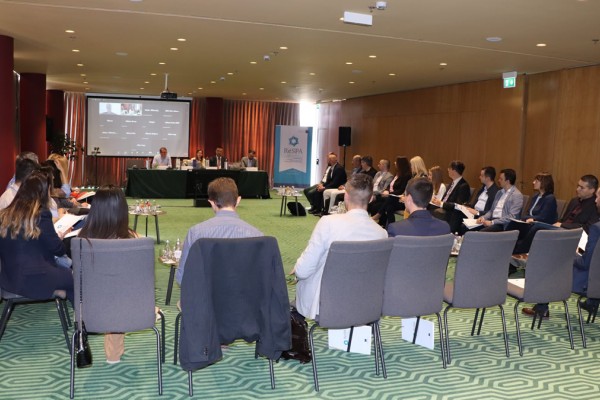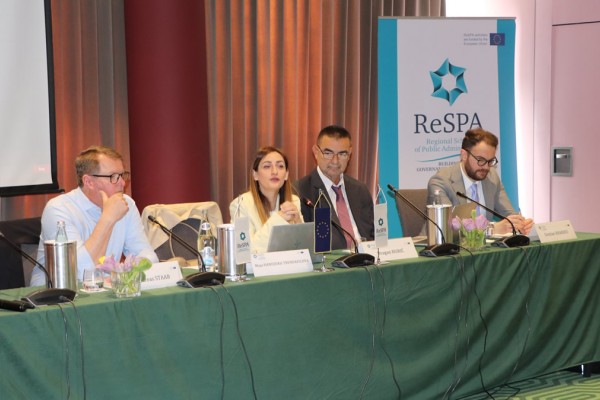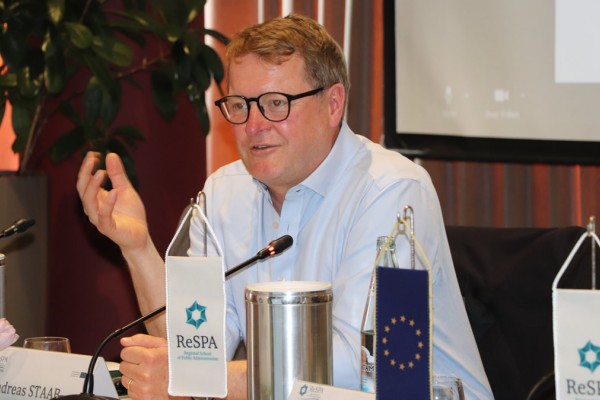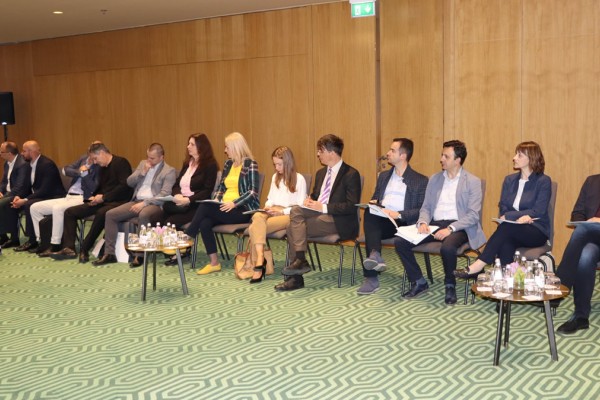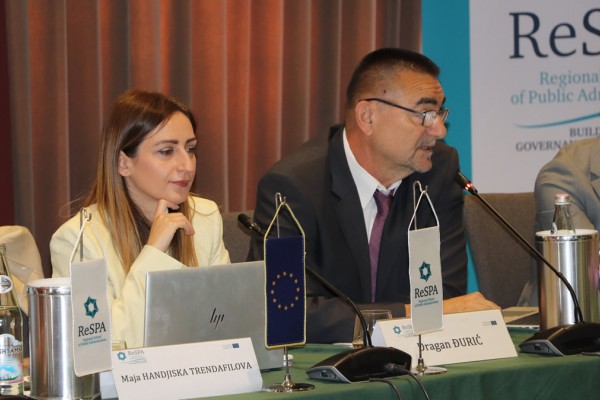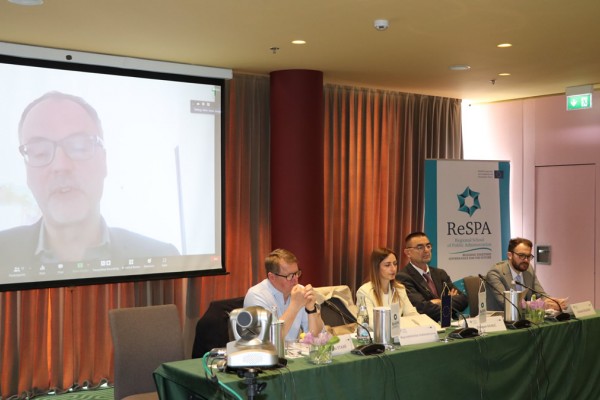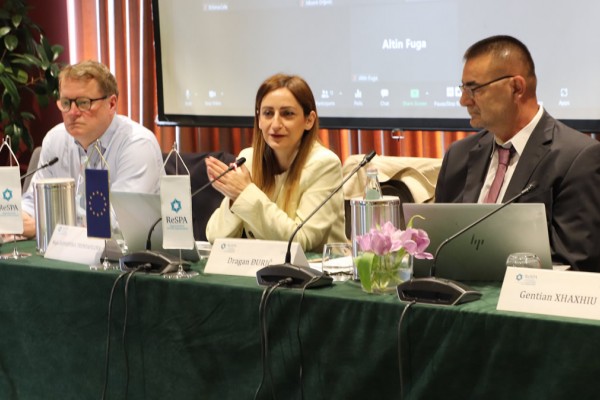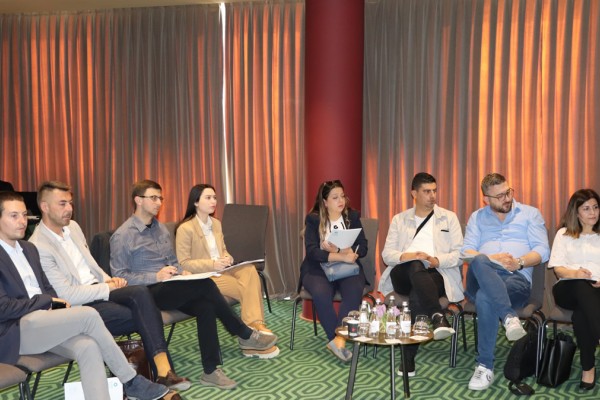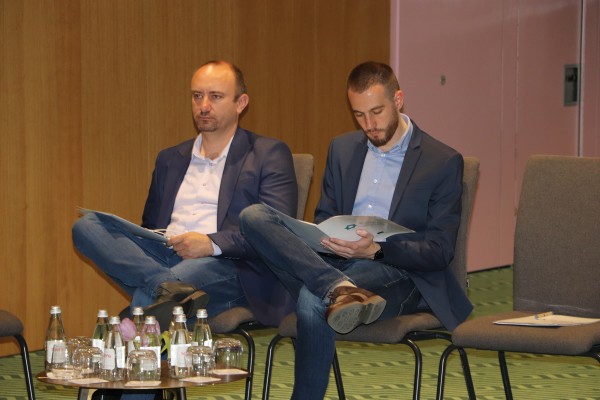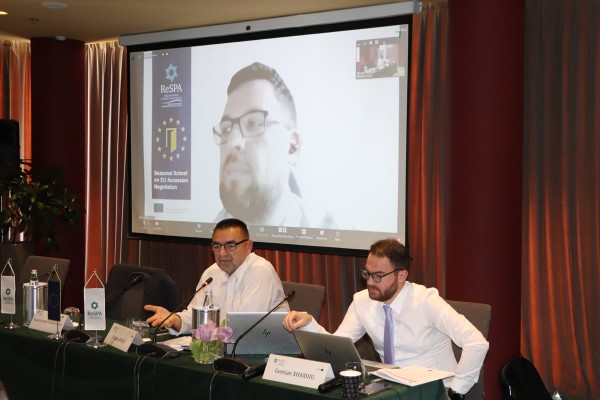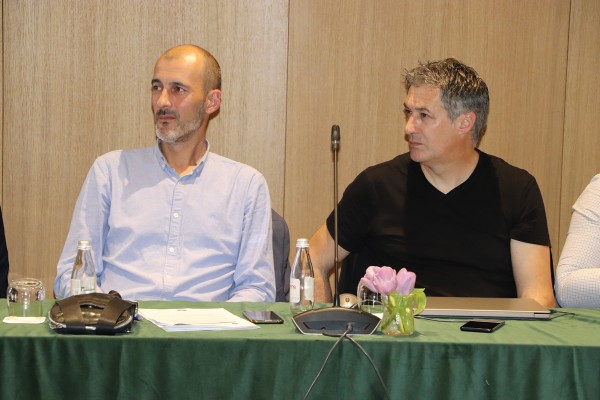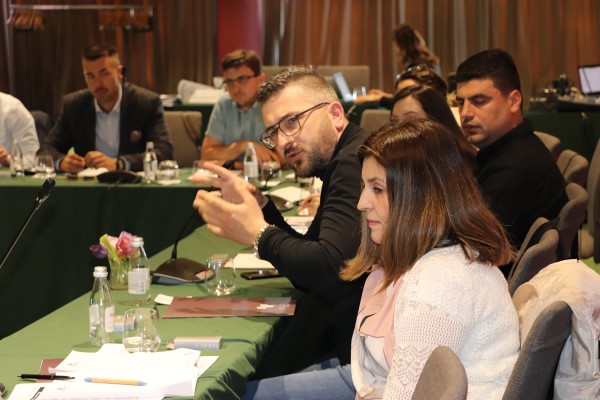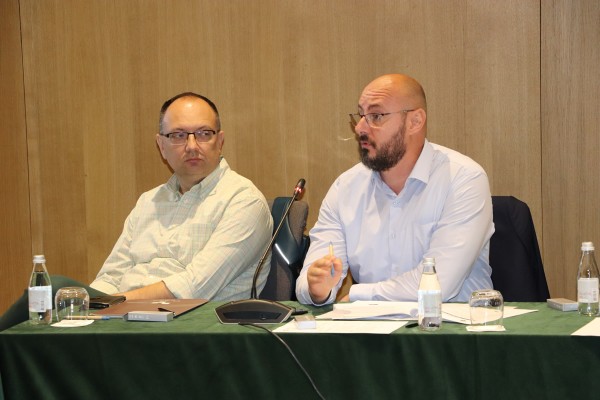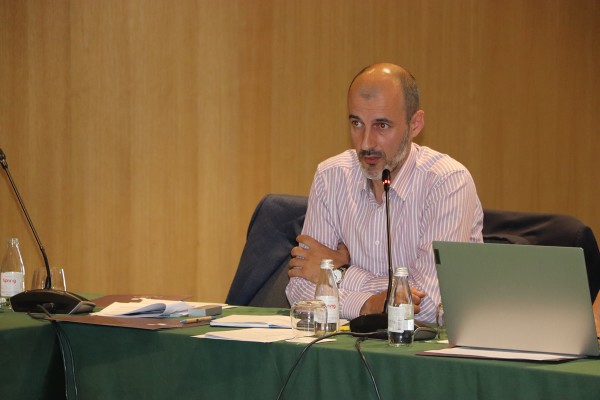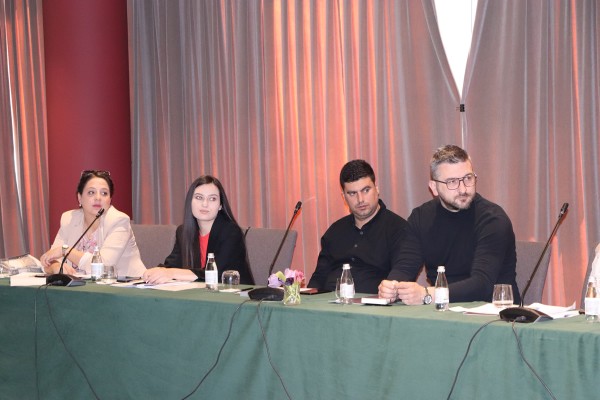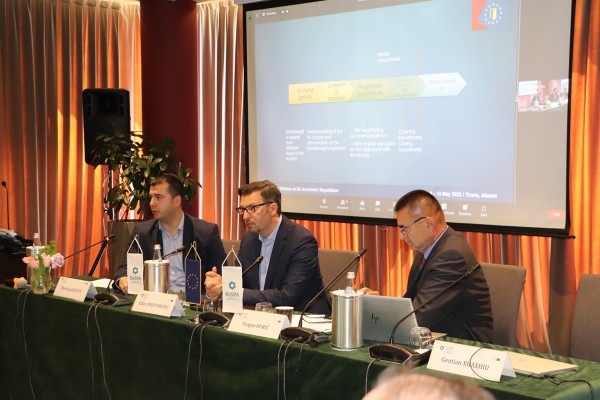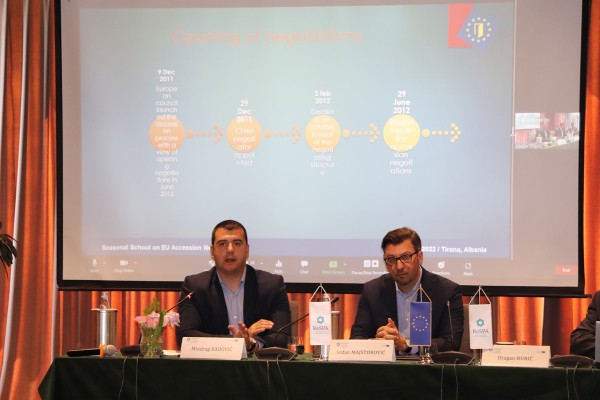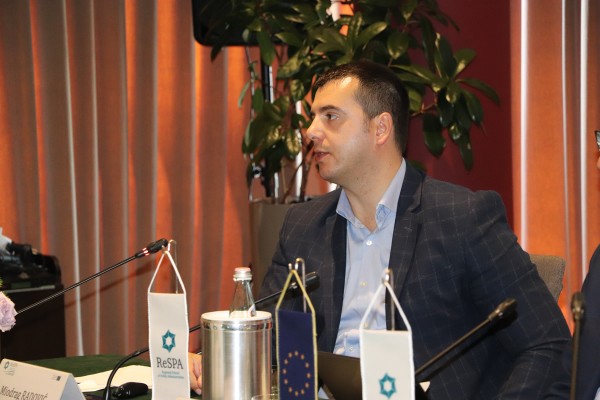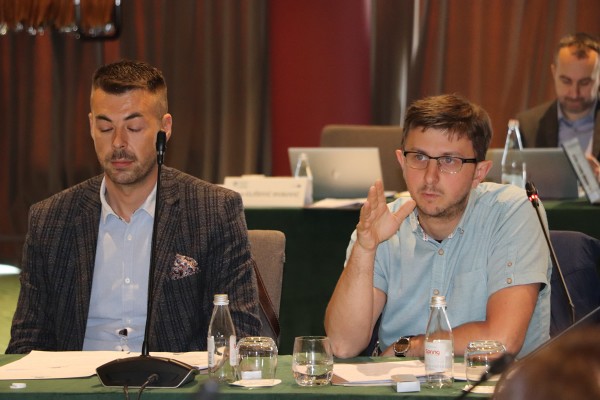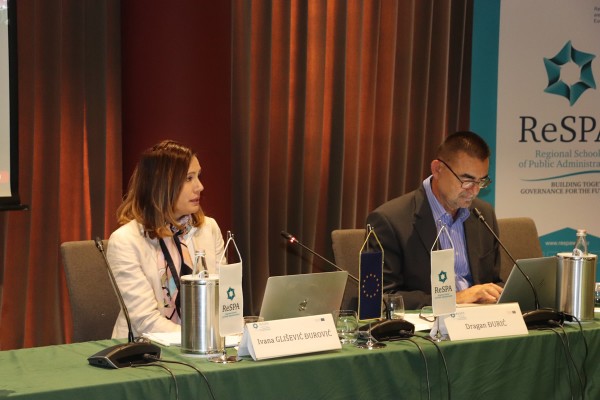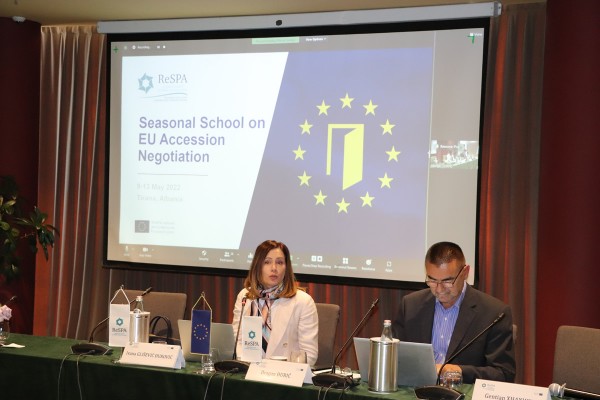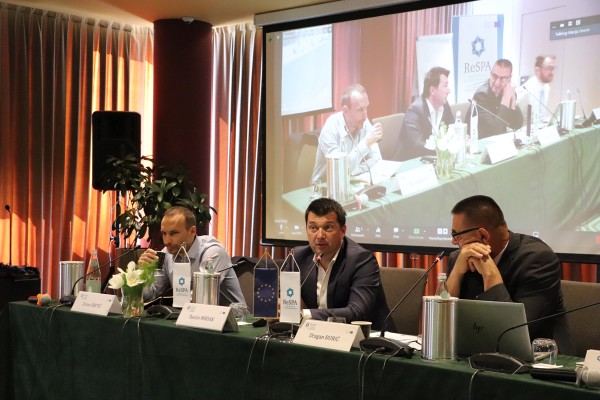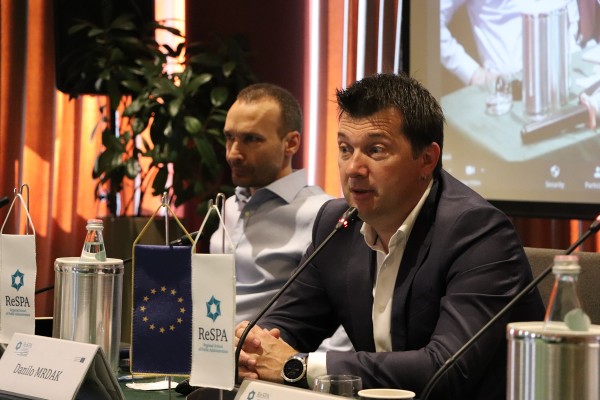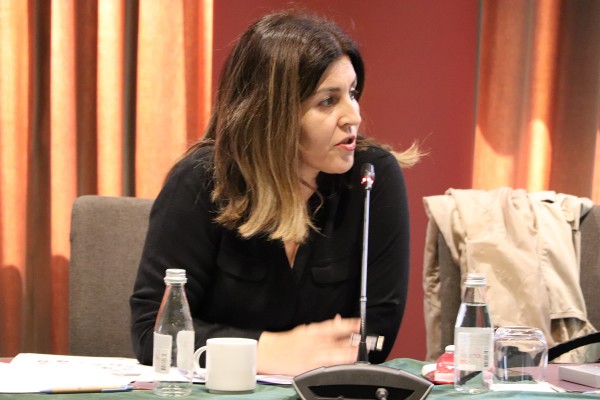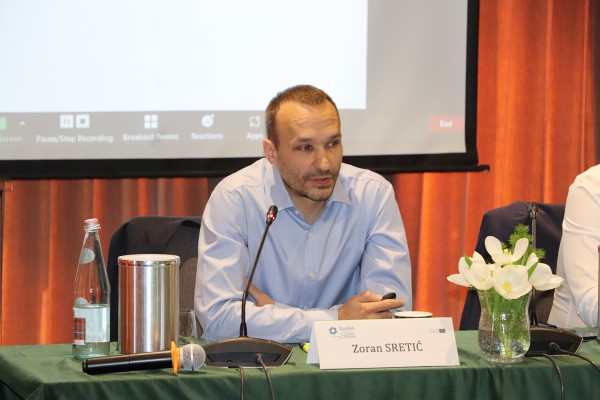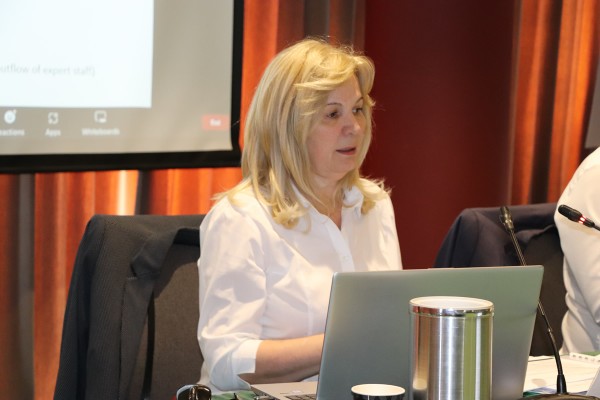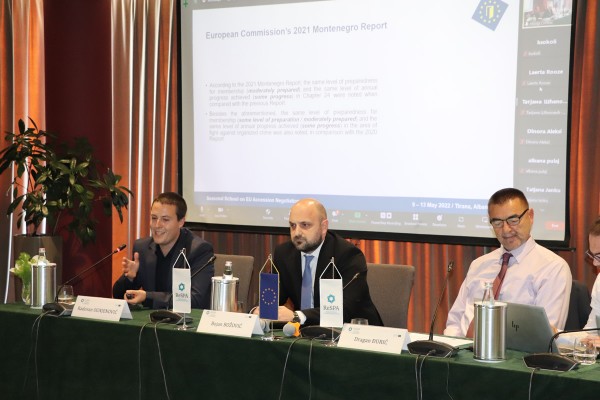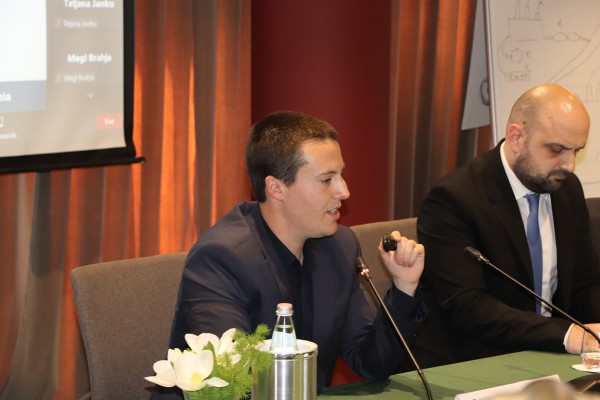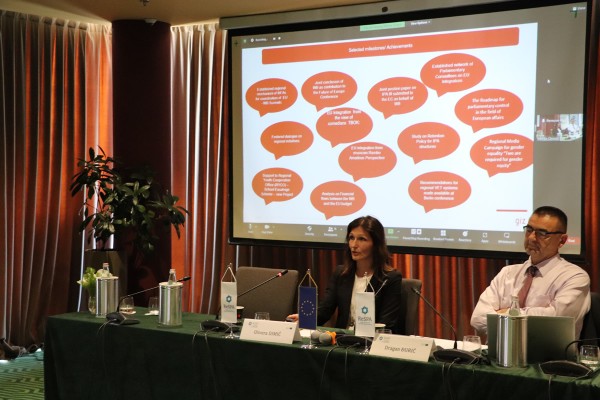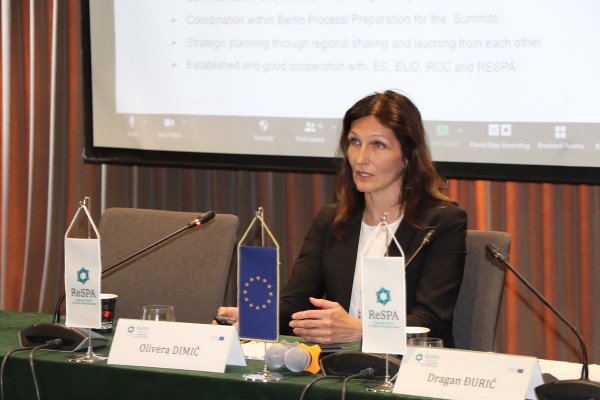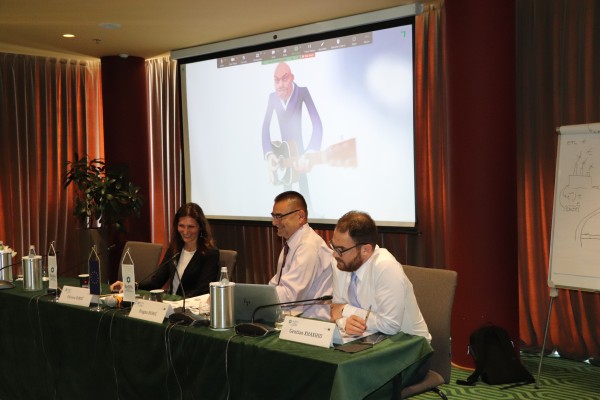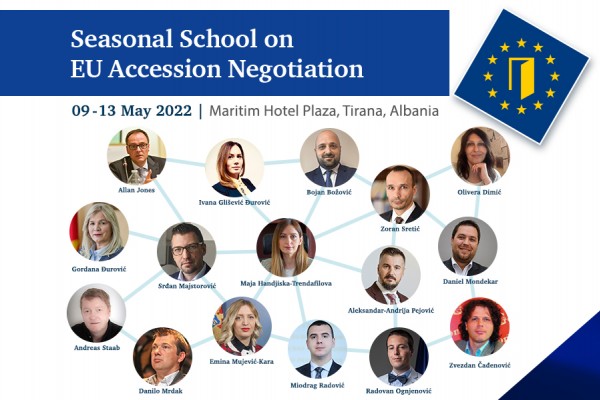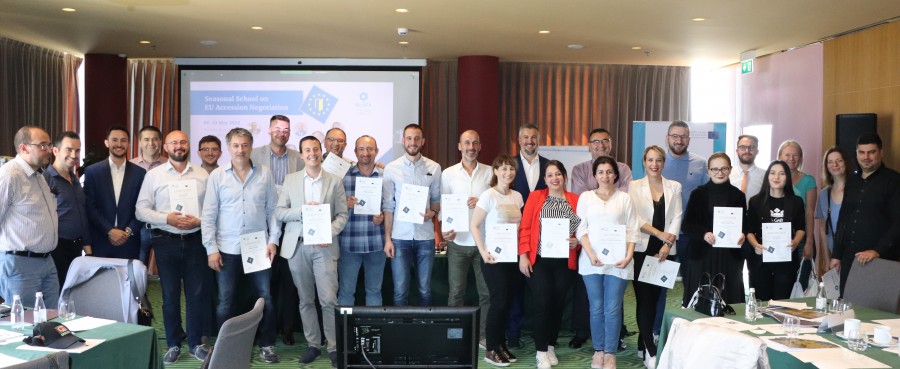
Seasonal School on EU Accession Negotiation: Knowledge and experience sharing as a strong impetus to the EU accession process and bringing EU values into our societies
9-13 May 2022, Tirana, Albania
ReSPA opens the Seasonal School on EU Accession Negotiation on the EU Day – a day that celebrates peace and unity throughout Europe.
The school is our traditional and robust mechanism for advancing the Western Balkans on their path to European integration and bringing EU values in reshaping our future.
During five days, civil servants dealing with the accession process can deep dive into the EU accession process, new accession negotiations methodology, legal and political dimensions of EU enlargement, and experiences from Montenegro and Serbia in the negotiation process.
At the opening of the School, Maja Handjiska Trendafilova, ReSPA Director, and Allan Jones, Head of the Thematic Support - Rule of Law, Governance and Security Unit in the Directorate-General for Neighbourhood and Enlargement Negotiations, European Commission, addressed the audience.
"This week, we are devoted to sharing the knowledge needed for the further invigoration of the EU project toward the better lives of our citizens". Marking Europe Day, ReSPA is organizing this Seasonal School that spurs investment in our knowledge, capacities and regional networks - which is ultimately an investment in Europe. We want to stimulate open, thought-provoking, illuminating discussions and experience sharing, primarily through concrete "walkthroughs" by our regional peers dealing with the EU accession-negotiation process", underscore Maja Handjiska-Trendafilova opening the event.
Allan Jones highlighted that ReSPA is "a key-regional endeavour in the PAR universe" supported by the European Commission in its commitment to strategic and expert support of Members. "This Seasonal School, I think, is an excellent example of the continuous commitment from ReSPA to a company of public administrations in Member countries to tackle current and upcoming challenges on reforms. The School this year includes specific sessions by representatives of Serbia and Montenegro. It gives you an opportunity to learn from these experiences in different aspects of the EU negotiations, whether in terms of institutional coordination or the content of the negotiation and challenges faced in individual chapters. Sharing experiences is the hallmark of successful regional cooperation, especially on the issues that we call fundamentals. Ultimately, you have the same objectives, work and goals that should be delivered, matching criteria and methods that region becomes an integral part of the European Union. Successful reforms will open the door towards the EU, but also will open the door to more successful economies and more resilient societies, which we need now more than ever," said Mr Jones.
DAY 1: Discussing the current challenges of the European Integration process
During the first day of the school, the attendees gave an insight into the EU's rules and policies and the perspective of the new member states.
Andreas Staab, founder and Managing Director of EPIC – the European Policy Information Centre, gave an overview of the EU's rules on safeguarding the Single Market and presented the Competition State Aid, and Foreign and Security Policies.
Daniel Montemar, independent EU Affairs consultant, and EU Funds expert, elaborated the critical changes that EU membership brought to the new member state and how Covid-19 affects the life in EU. Mr Montemar also gave a brief perspective on how the current crisis affects the EU and potential new member states, what the French presidency of the EU can bring to the table regarding accession of new countries and the prospective implications of the war in Ukraine for the EU integration process.
DAY 2: Introduction of Montenegrin and Serbian experiences in preparation for the negotiations
On the second day, eminent experts from Montenegro and Serbia presented the experience of their respective countries in preparation for negotiations, establishing, and functioning of the complex EU accession negotiations structures.
Miodrag Radović, Former Negotiator for chapters 23 and 24, and Deputy Chief Negotiator before becoming Head of Cabinet/Chief of Staff of the President of Montenegro, presented the Montenegrin accession negotiation process. Radović explained the process of development, restructuring over time and functioning of the negotiation structure from the screening process till the introduction of the new methodology. The participants discussed concrete examples and comparative experiences through an interactive presentation, including hits and misses made in this process.
Srđan Majstorović, one of the leading experts on the EU integration process in Serbia, presented the basic principles used for Serbia's EU accession negotiations. Majstorović also introduced the EU accession process's different structures/coordination mechanisms, elaborating on the role of various actors included in this process and providing insights on the learned key lessons that could improve the coordination process in the future. As such, the presentation provided the floor for sharing ideas for those countries preparing to start the EU accession negotiations.
Both presentations initiated lively discussion on complex questions related to the further perspective of EU accession of the Western Balkans.
Finally, Ivana Glišević-Đurović, Former National IPA Coordinator (NIPAC)/ Negotiator for Chapter 22 in Montenegro, explained the specific Action plan for Chapter 22, which aims to prepare the country for the utilization of ESI funds. She focused on the legislative framework of the Action plan (which covers broad areas such are public procurement, state aid, environmental protection, transport, budget legislation, public-private partnerships and concessions, anti-discrimination and equal opportunities). Gleevec-Đurović also provided examples of the exciting projects in the neighbourhood financed from European Structural funds. "The Success in using ESI funds depends ultimately on the general development policy, the number of projects that will be ready for implementation and the preparedness of all structures included in the system of use of European funds", pointed out Glišević-Đurović.
DAY 3: Sharing practical experiences from Montenegro and Serbia in specific Chapters and presentation of regional initiatives in support of WB in the European Integration process
During the third day of the school, four eminent experts shared their insights, experiences and practical knowledge related to Chapter 27 (Environmental and Climate Change), Chapter 23 (Judiciary & Fundamental Rights) and Chapter 24 (Justice, Freedom & Security), while experts from UNDP and GIZ gave an overview of their assistance in the EU accession process of the Western Balkans.
Danilo Mrdak, professor at the University of Montenegro (manager in many projects related to the implementation of European regulations) and Zoran Sretić, EU law expert from Serbia, gave practical examples from Montenegro and Serbia related to Chapter 27. They emphasized that negotiating on this chapter is quite challenging and it requires specific administrative and human capacities, therefore ensuring institutional memory is very important. They also provided approaches that enlargement countries might consider to implement in order to make faster progress in the accession negotiations.
Gordana Đurović, former Deputy Prime Minister for EU integration in Montenegro, in her presentation of the Montenegrin experience related to Chapter 27, focused on the financial aspect of the Action plan and estimation methods of specific groups of activities or investments. "The costing methods applied in this case could be a useful model for preparing similar action plans for other negotiation chapters", pointed out Đurović. She also emphasised that administrations need to support the negotiating teams with continuous capacity building efforts, in order to keep up the pace of effective and efficient accession talks.
Bojan Božović, State Secretary in the Ministry of Justice, Human and Minority Rights of Montenegro and Radovan Ognjenović, UNDP Local Consultant for negotiating Chapter 24, provided insights on essential steps taken in the negotiating process in Montenegro within Chapter 23 and 24 by highlighting critical remaining challenges. The new Enlargement methodology, requires that specific attention is paid to these two chapters, as a prerequisite for dynamic accession talk process.
At the closing presentation, Olivera Dimić, Senior Project Manager in GIZ, highlighted how regional cooperation is vital for the EU Integration process and how GIZ, through regional projects, support the Western Balkans in their EU aspiration. She emphasised that organizations like GIZ and ReSPA need to liaise and join forces in improving the capacities of public administrations in the region.
DAY 4: Montenegrin experience in dealing with Chapters 7, 14, 21 and 28
The fourth day of the School was devoted to sharing knowledge, practical examples, and recommendations on those Chapters of the acquis related to Intellectual property law, transport policy, trans-European networks, and Consumer protection and health.
Emina Mujević-Kara, Former Director-General of Directorate for International Cooperation and EU Funds in Montenegro who participated in the negotiation process with the EU, and Zvezdan Čađenović, Montenegrin Legal Expert with more than two decades experience in approximation and harmonization of laws, rules and regulations with EU Internal market acquis, addressed numerous topics related to particular chapters and gave valuable perspectives and advice on boosting the effectiveness of the negotiation process, especially on matters related to consumer protection.
In particular, session's deliberations focused on ways to deal with intellectual property in the digitized age where almost everything is intellectual property. Discussions also centered on the ways in which the transport policy can help the economy develop a modern infrastructure network that makes journeys quicker and safer while promoting sustainable and digital solutions. In addition, Mujević-Kara paid particular attention to advising the colleagues on how to deal with a long process of negotiating within Chapter 21 “Trans-European Networks”, emphasizing that the Green Deal for Western Balkans and the Economic and Investment Plan for the WB should serve as guiding tools for developing policies and negotiation positions in this domain. While Čađenović focused on the importance of timely and faithful harmonization of legislation, on the one hand, and the development of measures required for consumer protection and health, on the other hand.
DAY 5: Exercising specific aspects of the diplomatic negotiations
During the last day of the School, participants were engaged in practical exercises on the main aspects of the negotiations, phases of the negotiations, different technics of the negotiation, as well as tools utilised during the negotiations. Guided by Aleksandar-Andrija Pejović, former Chief negotiator of Montenegro and a senior expert in EU affairs, participants put in practice specific aspects of the diplomatic negotiations. Pejović also delivered brief keynote remarks on Foreign, Security and Neighbourhood Policies and inspired discussions on issues such as EU’s policy of preserving peace and strengthening international security, promoting international cooperation, developing and strengthening democracy, rule of law and respect of human rights and fundamental rights, as well as EU’s policy towards its neighbours.
After five intensive working days of the School, participants provided their comments and feedback on the various components of this year School and identified concrete topics to be taken into consideration for the next Seasonal School.
The attendees of the School were also awarded the ReSPA Certificate for this important event.
The Seasonal School on Accession Negotiations 2022 brought together 30 public servants dealing with EU accession, acquis alignment and accession negotiations from the ReSPA Members. In addition, around 40 public servants followed online the various sessions of the Programme.




